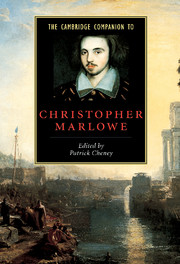Book contents
- Frontmatter
- 1 Introduction: Marlowe in the twenty-first century
- 2 Marlowe’s life
- 3 Marlovian texts and authorship
- 4 Marlowe and style
- 5 Marlowe and the politics of religion
- 6 Marlowe and the English literary scene
- 7 Marlowe’s poems and classicism
- 8 Tamburlaine the Great, Parts One and Two
- 9 The Jew of Malta
- 10 Edward II
- 11 Doctor Faustus
- 12 Dido, Queen of Carthage and The Massacre at Paris
- 13 Tragedy, patronage, and power
- 14 Geography and identity in Marlowe
- 15 Marlowe’s men and women
- 16 Marlowe in theatre and film
- 17 Marlowe’s reception and influence
- Reference Works
- Index
- Series list
- Plate section
3 - Marlovian texts and authorship
Published online by Cambridge University Press: 28 May 2006
- Frontmatter
- 1 Introduction: Marlowe in the twenty-first century
- 2 Marlowe’s life
- 3 Marlovian texts and authorship
- 4 Marlowe and style
- 5 Marlowe and the politics of religion
- 6 Marlowe and the English literary scene
- 7 Marlowe’s poems and classicism
- 8 Tamburlaine the Great, Parts One and Two
- 9 The Jew of Malta
- 10 Edward II
- 11 Doctor Faustus
- 12 Dido, Queen of Carthage and The Massacre at Paris
- 13 Tragedy, patronage, and power
- 14 Geography and identity in Marlowe
- 15 Marlowe’s men and women
- 16 Marlowe in theatre and film
- 17 Marlowe’s reception and influence
- Reference Works
- Index
- Series list
- Plate section
Summary
None of Marlowe's plays or poems exist in manuscript (for one partial exception, see the discussion of The Massacre at Paris, below). Our earliest witnesses are printed. Printed texts reveal a great deal about the circumstances of printing; but they can also be encouraged to speak about the circumstances of composition and consumption. A chapter about Marlovian texts and authorship is thus also a chapter about critics and readers, about tastes and preferences: not just about what Marlowe wrote but about how it was received.
The first of Marlowe's texts to reach print was Tamburlaine, possibly his first play. On 14 August 1590 the publisher Richard Jones made an entry in the Stationers' Register (the register in which publishers entered their right to a work) for the two parts of Tamburlaine. In the same year he published both parts as a single volume, in a small octavo format.
The title page is an endearing example of early modern advertising. It provides a racy plot summary, boasts of recent stage success, and promotes the quarto as hot off the press:
Tamburlaine the Great. Who, from a Scythian shepherd, by his rare and wonderful conquests, became a most puissant and mighty monarch, and (for his tyranny and terror in war) was termed ‘The Scourge of God’. Divided into two tragical discourses, as they were sundry times showed upon stages in the city of London by the right honourable Lord Admiral his servants. Now first and newly published.
- Type
- Chapter
- Information
- The Cambridge Companion to Christopher Marlowe , pp. 41 - 54Publisher: Cambridge University PressPrint publication year: 2004
- 2
- Cited by



